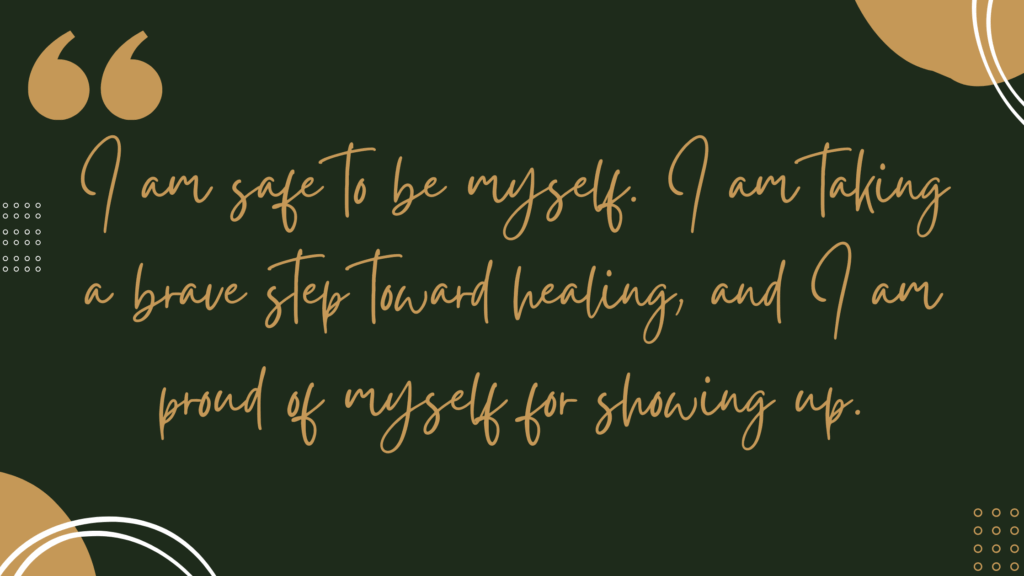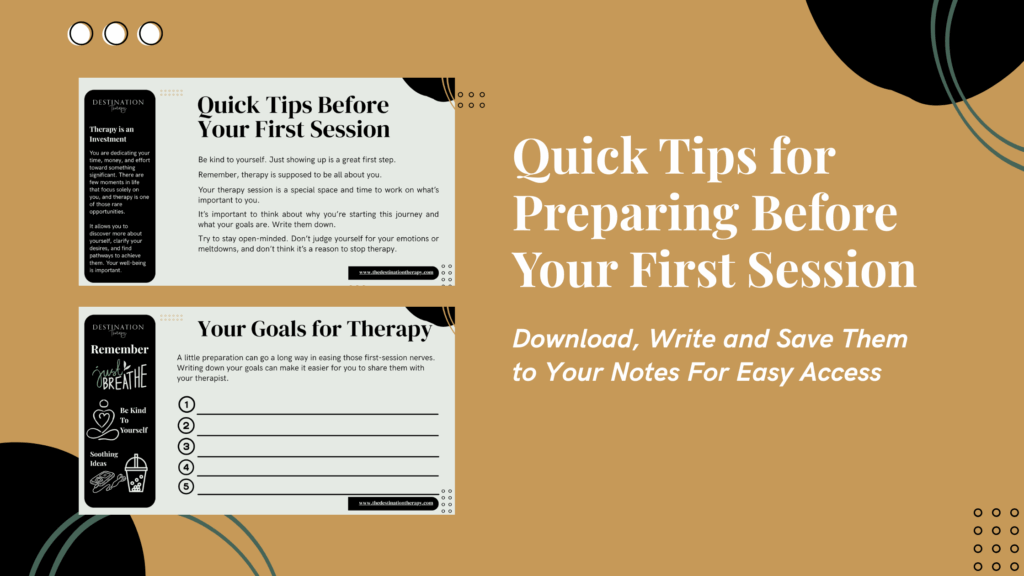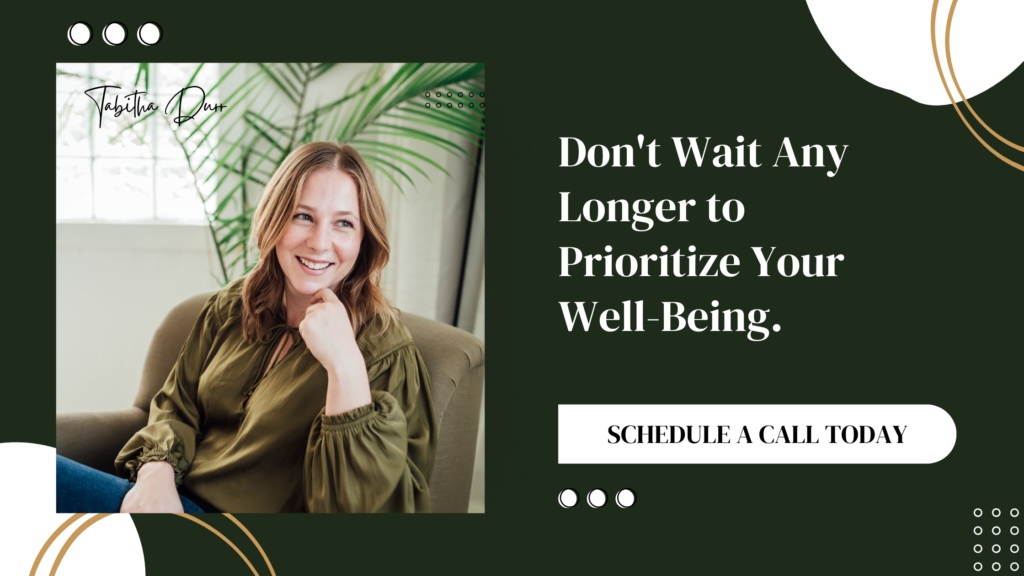Starting therapy for the first time can feel like a big step…maybe even a little scary. You might be feeling a mix of nervousness, curiosity, and hope, and that’s completely okay! It’s the beginning of something new, something just for you: your growth, your healing, your space to be heard.
You might be wondering, “What do I even say?” or “What if I get emotional?” Don’t worry, you’re not alone in feeling that way. This blog is here to help you feel a little more grounded and a lot more confident before that first session. We’ll walk you through what to expect, how therapy works, and some simple ways to prepare so you can show up as yourself…whatever that looks like right now.
Table of Contents
Understanding First Therapy Session Anxiety
Therapy is a vulnerable thing, sitting down with someone you don’t know and opening up about things you might not even say out loud to yourself can be very nerve-wracking. But that’s totally normal!
That nervous energy usually comes from not knowing what to expect, and from the very human fear of being seen too deeply. But here’s the thing: just by noticing and naming those feelings, you’re already doing something brave. You’re showing up for yourself, and that matters!
It’s also normal to feel a bit torn. Part of you might be hopeful, ready to feel better and start working through things. And another part might be quietly wondering, “What if this is awkward? What if I don’t know what to say?” That emotional tug-of-war is real and valid. Instead of brushing those thoughts aside, try to gently acknowledge them. Being honest with yourself is a big part of what therapy is all about.
If you’re worried about being judged or not “doing it right,” take a breath. Therapists aren’t there to critique or fix you; they’re there to listen, support, and help guide you at your own pace. They know that showing up takes courage, and they’re ready to meet you exactly where you are.
You don’t have to have all the answers. You just have to start.
Common Causes of Anxiety Before Therapy
There are a few common reasons why these nerves show up, and knowing what they are can actually help you feel a bit more at ease.
- The fear of being judged. Opening up about your life, especially the parts that feel messy or painful, can feel really vulnerable. But here’s the thing: therapists are trained to listen without judgment. Their role is to create a space where you can be your full, honest self without fear of criticism or shame.
- Not knowing what to expect. What will the therapist ask? Will you have to talk the whole time? What if you don’t know where to start? All of those unknowns can make your head spin. But the good news is, you don’t have to have it all figured out. Part of therapy is learning as you go, and we’ll walk you through what the first session might look like later in this blog.
- The fear of digging into hard stuff. You might already know there are topics you’ve been avoiding, and the idea of saying them out loud can feel heavy. Just know: you’re in control. You get to decide what to share and when. Therapy isn’t about rushing into the hard parts; it’s about moving at your own pace, with someone by your side who’s trained to help you carry the weight.
The Importance of Acknowledging Your Feelings
As we’ve said, it’s completely normal to feel a little anxious before your first therapy session, and acknowledging that anxiety is actually a powerful first step. When you take a moment to notice what you’re feeling and call it out, you’re already starting to take back control over your emotions.
Pushing those feelings aside or pretending they’re not there doesn’t make them disappear. In fact, bottled-up emotions often show up in other ways, like tension in your body, trouble sleeping, or feeling extra agitated. But when you give those feelings a name and a little bit of space, it becomes much easier to work with them rather than against them.
And here’s the thing: therapy is meant to be a space where you explore what’s going on inside. So by checking in with yourself ahead of time, you’re already doing the kind of thoughtful work that therapy is all about. It’s a simple yet meaningful way to walk into your first session with a bit more clarity and a lot more confidence.
Tips for Preparing for Your First Therapy Session
A little preparation can go a long way in easing those first-session nerves. One great place to start is by thinking about what you want to get out of therapy. Are you hoping to feel less anxious? Work through something heavy? Improve a relationship? Get to know yourself better? You don’t need to have all the answers right now, but having a general idea of your goals can help guide the conversation and give your therapist a clearer picture of how to support you.
Another helpful step is jotting down a few thoughts beforehand. You could write in a journal, type a note on your phone, or even just make a quick list…whatever feels easiest. Think about what’s been weighing on you lately or what you’d like to bring up in that first session. This way, if your mind goes blank, you’ve got something to fall back on.
And don’t forget the simple stuff. Know how you’re getting to your appointment? Got the address or login link saved? If it’s online, make sure your laptop or phone is charged and working. Sorting out these little details ahead of time can really help you show up feeling more grounded and less rushed.
What to Expect During Your First Session
Your first therapy session is really about getting to know each other and beginning to build a space where you can feel safe and supported.
Your therapist will likely ask you a few questions about your life, things like your background, what’s been going on lately, and what led you to seek support. Don’t worry about saying things “the right way”…this is your time, and your therapist is there to listen, not judge. Think of it as a gentle, open conversation designed to help them understand how to best support you.
They’ll also explain how they work, their style, the methods they use, and what the process might look like moving forward. This is the perfect time to ask anything you’re curious or unsure about, whether it’s how often you’ll meet, how progress is tracked, or what confidentiality really means.
And here’s something really important: the first session isn’t just about your therapist getting to know you, it’s also your chance to get a feel for them. Feeling heard and comfortable with your therapist is key to making therapy work. So trust your gut. If something doesn’t quite click, that’s totally okay. You deserve a therapist who feels like the right fit for you.
Effective Communication with Your Therapist
Effective communication is at the heart of a good therapy experience. The more open and honest you can be, the better your therapist can understand what you’re going through and support you in the way that works best for you. That said, opening up isn’t always easy, especially if you’re not used to sharing your feelings out loud.
If you’re not sure how to put something into words, that’s totally okay. You can say that. Let your therapist know you’re having a hard time expressing something; it’s part of the process, and they’re trained to help you sort through it. The more you can communicate, even if it’s just “I don’t know how I feel right now”, the more you’ll get out of your sessions.
It’s also completely okay (and encouraged!) to give feedback about how therapy is going. If something doesn’t feel helpful, or if you’re unsure about the pace or direction, speak up. Therapy should feel like a collaboration, not a one-way street. Your input matters.
And don’t forget, listening is part of the conversation, too. Take a moment to really hear what your therapist is saying. If something they say doesn’t make sense or feels off, ask about it. Therapy isn’t about having all the answers right away—it’s about exploring together. So ask the questions, voice your thoughts, and be curious. This is your space, and it should work for you.
Strategies to Manage Anxiety Before A Therapy Session
There are a few simple things you can do to help ease your anxiety before your first session and show up feeling a little more grounded.
First, try some deep breathing. It sounds basic, but it really works. A few slow, intentional breaths can help calm your body, especially if your heart’s racing or you’re feeling a little short of breath. Even just pausing for a minute to breathe can help create a sense of calm and control.
Another great trick is visualization. Picture yourself walking into the therapy space, maybe it’s a cozy room or a Zoom screen, greeting your therapist, and starting the conversation. Imagine it going smoothly. Imagine feeling seen, heard, and supported. Practicing this little mental run-through can make the real thing feel more familiar and way less intimidating.
You can also do something soothing beforehand to get in the right headspace. Take a short walk, listen to your favorite playlist, stretch, sip some coffee or tea…whatever helps you feel centered. Everyone’s different, so play around and see what feels good for you.
The Role of Mindfulness and Relaxation Techniques
Another powerful tool is mindfulness. At its core, mindfulness is simply about being present, really tuning in to what’s happening right now without judging yourself. It might be as simple as focusing on your breath or noticing the sounds around you. These little moments of awareness can help quiet racing thoughts and bring you back to center, especially when your mind wants to wander into worry or overthinking.
Another helpful technique is progressive muscle relaxation. This is where you tense, then slowly release different muscle groups in your body, like your shoulders, hands, or legs. It’s a great way to let go of the physical tension that often comes with anxiety, and it can also give your mind a much-needed break.
If you’ve ever daydreamed about being on a peaceful beach or in a cozy cabin in the woods…good news! That’s actually a form of guided imagery. Imagining a calming scene can shift your mental state and help create a sense of safety and calm before stepping into a therapy session.
These techniques aren’t about perfection; they’re about giving yourself tools to feel more grounded. Try them out, see what works for you, and keep them in your back pocket for whenever you need a little extra support.
Reflect After Your First Session Experience
After your first therapy session, it’s a good idea to give yourself a little space to process. How did it feel to talk things out? Were there moments where you felt truly seen or heard? Or maybe parts that felt awkward, or like you weren’t quite sure what to say? All of that is completely valid.
Taking time to reflect, whether it’s in your head, in a journal, or just during a quiet walk, can help you start to notice what you need from therapy. You might reflect on what stood out, what felt helpful, or even what felt tough. Not only can that help you make sense of the experience, but it also gives you a way to track your growth over time.
You might also start to get a clearer sense of what you want to talk about next time. Maybe something came up in the session that you want to explore more, or maybe you realized there’s something else that feels more important. Don’t worry if you’re not totally sure yet, it’s okay to figure things out as you go.
Just remember: this is your space, and your voice matters. Therapy works best when you’re honest about what’s going on for you, so trust yourself and take it one step at a time.

Moving Forward: Building Confidence in Therapy
Feeling confident in therapy doesn’t happen overnight; it’s something that grows with time. One of the biggest reasons for this is the connection you build with your therapist. As you spend more time together, you’ll probably start feeling more at ease and secure in your sessions. That sense of trust comes from being open and honest, even when it feels hard.
Showing up regularly and really leaning into the process can also boost your confidence. The more you invest in yourself through therapy, the more you’ll start to notice changes, big or small, that remind you this journey is worth it. And don’t forget to celebrate those little wins along the way…they’re proof of your progress and your strength.
Remember, therapy is your personal journey. There’s no “right” way to feel or move forward. Be gentle with yourself and trust that, with time, therapy can become a powerful part of your life, helping you face challenges, grow, and find your own kind of well-being.
We Are Here For You
Whether you’re battling anxiety, depression, perfectionism, or navigating relationship challenges, Destination Therapy empowers you to achieve the peace, ease, and fulfillment you deserve.
We offer convenient telehealth across Texas, Massachusetts, California, Florida, Utah, and New York.




